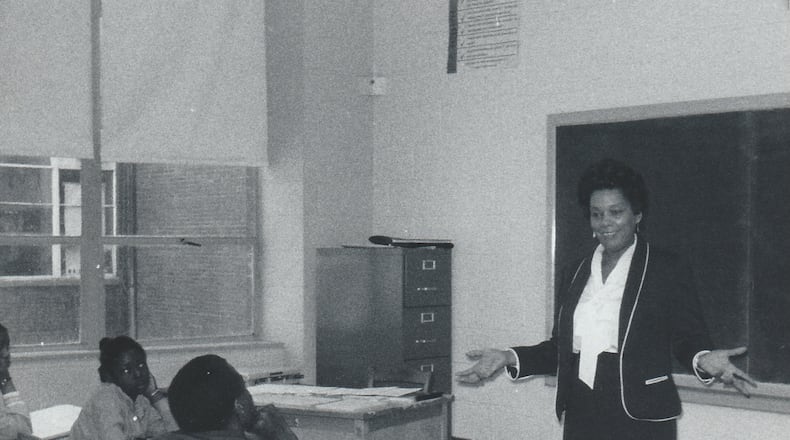The term “Hidden Figures” derives from the title of the 2016 feature film that told the true story of three African American women whose exceptional math skills helped NASA win the space race against the Soviet Union in the 1960s. But the term has evolved to mean all Black women whose significant contributions to our country’s technological advances have previously gone unrecognized. Counted among them is Raye Montague, an Arkansas native who endured racism and sexism growing up in the Jim Crow South, but who still managed to revolutionize the Navy’s shipbuilding industry.
“Overnight Code” is a new book by Atlanta author Paige Bowers and the subject’s son, David Montague, that tells the engineer’s remarkable life story that includes, among her many achievements, starting the Navy ROTC program at Morehouse College.
According to David Montague, it took a long time for his mother to realize her story was worth telling. A popular public speaker to civic groups and social clubs, Raye Montague was often greeted after her speaking engagements by gushing audience members who begged her to write a book. But she never took it seriously until her appearance on “Good Morning America” in 2017 prompted a literary agent to call and request a manuscript.
Montague’s son was a former federal investigator for the DEA and a professor of criminal justice at the University of Arkansas who had previously written a textbook, so she enlisted his help to write her memoir. It didn’t take long for him to realize he was out of his element.
“I was so arrogantly wrong,” he said. “It proved a lot harder than I thought. Unlike writing a textbook, this project was really about linking everything along a timeline, connecting different characters, delving into documents and interviews. I was way in over my head.”
That’s when the literary agent introduced the Montagues to Bowers, who had written “The General’s Niece,” a 2017 biography of Charles de Gaulle’s niece, a fighter for the French Resistance. With Bowers on board, the project gained momentum and quickly secured a publishing deal with Chicago Review Press, which had published Bowers’ previous book. But timing was against them. Raye Montague’s health took a turn and she died from congestive heart failure in October 2018 at age 83. At that point, Bowers and David Montague decided to work together and turn the book into a biography, which published Jan. 12.
Before she ever heard the word “engineer,” Raye Montague knew from the time she was a little girl that she wanted to be one. The realization struck one day when her grandfather took her to see a small Japanese submarine used in the attack on Pearl Harbor that was touring the country with a stop on the Arkansas River in Little Rock. When she saw all the dials and switches that operated the watercraft, Montague’s eyes lit up. According to “Overnight Code,” she asked the man giving her the tour, “What do you have to know to do this?” His answer was, “You have to be an engineer, but you don’t ever have to worry about that, little girl.”
Unaware she had been insulted, Raye Montague returned home and told her mother she wanted to be an engineer when she grew up. That set her on a lifelong course of perseverance and defying expectations. When the University of Arkansas wouldn’t accept her into its engineering degree program because she was Black, she pursued a bachelor of science degree in business at Arkansas AM&N. But while she was there, she took every math and science class she could.
By the time she graduated, she was married and living in Washington, D.C. She landed a job as a clerk-typist with the Navy’s Applied Mathematics Lab, one of the first government agencies to have a UNIVAC, the first general-purpose, commercially produced digital computer. She wasn’t allowed to operate the precious new machine, but she watched closely when others did. One day when all the department’s engineers were out sick, Raye Montague stepped up and ran the machine herself. Her boss promoted her on the spot to computer systems operator, and she began taking coding classes in her spare time.
Her life would take many twists and turns: She was passed over for a promotion because of her gender; she became a single mother when David was 9 weeks old; she endured a volatile marriage to a schizophrenic. But she always persevered and continued to advance in her career.
So just how did Raye Montague revolutionize the Navy?
“At that time, naval engineering was largely done by hand — drawn by hand, calculated laboriously,” said Bowers. Designing new ships “took several years, it cost tons of money, and sometimes you’d have to make adjustments, and redraw it and recalculate it. It took a long time.”
Raye Montague was tasked with debugging an existing but flawed computer program and figuring out how to make it design a ship and calculate the measurements. She was given a month to complete her assignment, but she did it in a weekend. When she ran the program for the first time, it spit out the designs for the Oliver Hazard Perry-class frigate in 18 hours and 26 minutes. It was a stunning achievement that far exceeded all expectations.
“She made the process of designing ships faster and more cost-effective for the U.S. Navy at a time when the U.S. was struggling to keep pace with the Soviet Union, and when the Soviet Union was far ahead of the U.S. in the ships they were building after the war,” said Bowers.
She would go on to work on the design for several more Navy ships, and in 1972 she received the Meritorious Civilian Service Award, one of the highest awards given to a civilian in a federal agency. Eventually she received certification as a licensed engineer, a job she had been performing for decades.
After retirement, Raye Montague became a highly sought-after public speaker who always stressed the importance of getting an education. Even after she grew frail and moved into an assisted-living facility, her son said she would counsel staff members on their career goals.
“She loved public speaking, and she loved the idea of being able to reach and motivate people,” said David Montague. “She didn’t care what their goal was, she just liked to inspire people to figure out their path and have the confidence to pursue it.”
When David Montague began attending Morehouse College, his mother noticed there was no ROTC program on campus. If Morehouse men wanted to join the ROTC, they had to go to the campus of the Georgia Institute of Technology. For Raye Montague, that just wouldn’t do, so she started the school’s Navy ROTC program. The first graduating class was the same year David graduated, making it a doubly proud day for her.
Raye Montague’s generosity is all the more remarkable considering the extraordinary challenges she had to overcome throughout her life.
“As somebody who fought and scrapped for everything she had, she stood as an encouraging mother figure and mentor to other people, urging them to do the same: Don’t give up. Stay in school. Follow your dreams,” said Bowers. “She touched a lot of lives.”
VIRTUAL AUTHOR EVENT
“Overnight Code.” Reading and signing with authors Paige Bowers and David Montague. Free. Presented by Read It Again Books in Suwanee. 6 p.m. Feb. 13. 770-232-9331, read-it-again.com.
About the Author
Keep Reading
The Latest
Featured





